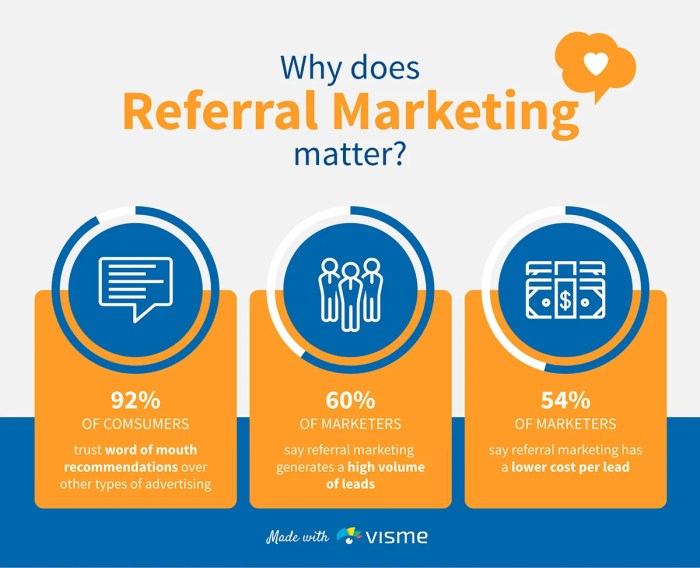Referral Marketing Ideas introduces readers to innovative ways to grow their business through engaging strategies. From unique programs to creative campaigns, this topic dives deep into the world of referral marketing with a fresh and captivating perspective.
Overview of Referral Marketing: Referral Marketing Ideas
Referral marketing is a powerful strategy where businesses encourage their existing customers to refer new customers to their products or services. This type of marketing relies on word-of-mouth recommendations and can be highly effective in driving growth and increasing sales.
Successful Referral Marketing Campaigns
- Dropbox: Dropbox offered extra storage space to users who referred friends, resulting in a significant increase in user base.
- Airbnb: Airbnb provided travel credits to both the referrer and the referee, leading to rapid expansion and increased bookings.
- Uber: Uber’s referral program rewarded both the referrer and referee with free rides, contributing to the company’s growth in new markets.
Benefits of Referral Marketing Strategy
- Cost-effective: Referral marketing can be more affordable than traditional advertising methods, as it leverages existing customers to bring in new business.
- Trust and Credibility: People are more likely to trust recommendations from friends or family, making referral marketing a powerful tool for building credibility.
- Increased Customer Loyalty: By rewarding existing customers for referrals, businesses can strengthen loyalty and incentivize repeat purchases.
Types of Referral Marketing Programs
Referral marketing programs come in various forms, each with its own set of benefits and drawbacks. Let’s explore some of the most common types of referral programs and how companies are effectively utilizing them.
Incentive-Based Referral Programs
Incentive-based referral programs offer rewards or incentives to customers who refer new business. Companies like Dropbox have successfully implemented this type of program, offering extra storage space to users who refer friends. The pros include increased customer loyalty and a cost-effective way to acquire new customers. However, some cons may include the possibility of attracting low-quality leads who are only interested in the incentive.
Affiliate Referral Programs
Affiliate referral programs involve partnering with individuals or businesses who promote your products or services in exchange for a commission. Amazon’s Affiliate Program is a prime example of this, where affiliates earn a percentage of sales generated through their referral links. The advantages of this program include a wider reach and the ability to tap into niche markets. On the other hand, a potential downside is the risk of relying too heavily on affiliates for sales.
Loyalty Referral Programs
Loyalty referral programs reward existing customers for referring friends or family. For example, Airbnb offers travel credits to both the referrer and the referee when a new user signs up. The benefits of this type of program include fostering customer loyalty and building a community around your brand. However, challenges may arise in tracking and managing the rewards effectively.
Each type of referral marketing program has its own unique advantages and drawbacks, and companies must carefully consider their goals and target audience when choosing the right program for their business.
Creative Referral Marketing Ideas

Referral marketing is a powerful tool for businesses to leverage their existing customer base to acquire new customers. To make your referral program stand out, consider implementing some unique and innovative ideas:
Gamify Referral Programs, Referral Marketing Ideas
One creative way to boost engagement and effectiveness in referral marketing is to gamify the program. By adding elements of competition, rewards, and levels, you can make the process more exciting for participants. Consider incorporating features like leaderboards, badges, and exclusive prizes to incentivize referrals.
Host Exclusive Events
Organize special events or experiences exclusively for referred customers. This can create a sense of exclusivity and loyalty among new customers, encouraging them to spread the word about your brand. Whether it’s a VIP party, behind-the-scenes tour, or personalized workshop, offering unique experiences can set your referral program apart.
Create Shareable Content
Develop engaging and shareable content that encourages referrals. This could include entertaining videos, interactive quizzes, or informative infographics that customers will want to pass along to their network. Make it easy for customers to share by providing social media buttons and referral links within the content.
Partner with Influencers
Collaborate with influencers or industry experts to promote your referral program. Influencers have a loyal following and can help amplify your message to a wider audience. By partnering with influencers who align with your brand values, you can reach new customers through authentic and trusted recommendations.
Offer Personalized Incentives
Instead of generic rewards, tailor incentives to the preferences and interests of your customers. Personalized incentives can make the referral process more meaningful and relevant to participants. Consider offering discounts on specific products, customized gifts, or exclusive experiences based on individual customer profiles.
Implementing a Successful Referral Marketing Strategy

Referral marketing can be a powerful tool to grow your business and increase customer loyalty. To create and launch a successful referral marketing program, follow these steps:
Creating a Referral Program
- Define your goals: Clearly Artikel what you want to achieve with your referral program, whether it’s acquiring new customers or increasing sales.
- Identify your target audience: Understand who your ideal customers are and tailor your program to appeal to them.
- Create compelling incentives: Offer rewards that motivate customers to refer their friends and family.
- Promote your program: Use multiple channels to spread the word about your referral program and encourage participation.
Tracking and Measuring Success
To track and measure the success of your referral marketing campaign, consider the following tips:
- Set specific KPIs: Establish key performance indicators to track the effectiveness of your program.
- Use analytics tools: Utilize software to monitor referral activity and measure results accurately.
- A/B testing: Experiment with different strategies to optimize your program and improve performance over time.
Optimizing Referral Processes
Optimizing your referral processes is crucial for providing a seamless customer experience. Here are some ways to ensure a smooth referral journey:
- Simplify the process: Make it easy for customers to refer their contacts by providing clear instructions and user-friendly interfaces.
- Automate where possible: Use technology to streamline the referral process and reduce manual effort for both customers and your team.
- Personalize interactions: Tailor communication with referrers and referees to enhance engagement and build stronger relationships.


